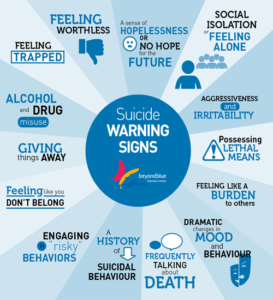Suicide and crisis care
If you or someone you know needs help now, call Lifeline on 13 11 14. If someone is in immediate danger, call Triple Zero (000).
- Call to speak with someone who cares.
- Call if you feel you might be in danger of hurting yourself.
- Call to find referrals to mental health services in your area.
- Call to speak to a crisis worker.
Services you can contact
Lifeline Australia provides a 24-hour phone crisis support service to anyone at anytime. Lifeline also provides information and training for family and friends of people at risk of suicide.
Phone 13 11 14
Kids Helpline is a free 24-hour counselling service for Australian kids and young people aged 5–25 years. Talk to a counsellor by phone, email or web chat about any issues.
Phone 1800 551 800
Reach Out is a web-based service that aims to improve the mental health and wellbeing of young people aged 14–25, with resources including videos, a forum, a blog and fact sheets for young people aged 14–25 years.
Salvocare Line is a 24-hour phone counselling service to people during times of crisis, loneliness, or depression.
Phone 1300 363 622
Suicide Call Back Service is a 24-hour, 7 days a week phone crisis counselling service for people at risk of suicide, carers of someone who is suicidal and those bereaved by suicide. You can also access up to 6 sessions of counselling with the same counsellor at times scheduled to suit you, if you don’t already have professional support.
Phone 1300 659 467
Crisis Planning
The following crisis plan templates are to help you plan what to do should a crisis occur. Putting it in writing as a care plan and sharing it with everyone involved means each person knows who is responsible for what and when if a crisis occurs.
ACT crisis action plan template This template has been created to be customisable on your device.
Lifeline coping kit includes template you can download and complete.
Wellness Recovery Action Plan (WRAP) – Crisis plan access tools, forms and advice for crisis and recovery plans.
Children of Parents with a Mental Illness (COPMI) provides crisis plan templates you can print and complete for the family:
Warning signs
Suicidal behaviour is complex, and while not all suicide deaths can be prevented, early intervention can prevent many suicide deaths.
When at risk of suicide, someone may display various behaviours and experience various emotions.

Image from Beyondblue
Warning signs of suicidal thoughts or plans to commit suicide include:
- looking for ways to hurt or kill oneself
- talking and writing about suicide or death
- feelings of hopelessness
- expressing rage, anger or revenge
- engaging in reckless or risky behaviours
- previous suicide attempts or self-harming
- increased use of drugs and alcohol
- withdrawing from friends and families
- quitting activities that were previously important
- putting affairs in order, e.g. giving away possessions, especially those that have special significance for the person
- anxiety or agitation
- abnormal sleep patterns
- dramatic changes in mood, such as sudden feelings of happiness after a long period of sadness, or depression
- writing a suicide note or goodbye letters to people.
Why would someone consider suicide?
Suicide can seem like the only way out of a situation or the negative feelings that someone is experiencing. There are many reasons why someone considers suicide, such as:
- an argument with a loved one or significant person
- the breakdown of a relationship
- the suicide of a family member, friend or public role model
- the onset or recurrence of a mental or physical illness
- unexpected changes in life circumstances
- unemployment
- financial or legal problems
- a traumatic life event (for example abuse, bullying or violence).
Suicide prevention
Reduce the risk of suicide by:
- knowing the risk factors
- being alert to the signs of depression and other mental disorders
- recognising the warning signs for suicide
- letting someone know – either a trusted person or a friendly voice from a helpline
What should I do if I think someone is suicidal?
People who receive support from friends and family, and have access to mental health services, are less likely to act on their suicidal impulses than those who are socially isolated. If someone you know is exhibiting warning signs:
- ask if they are depressed or thinking about suicide
- check if they are seeing a therapist or taking medication
- assure them they are not alone and there is hope of things getting better
- tell them that you care and encourage them to seek professional help.
If you believe someone you know is in immediate danger of committing suicide:
- do not leave them alone—if possible, ask for help from friends or family members
- ask them to give you any weapons they have, and remove sharp objects or anything else they could use to hurt themselves
- try to keep them as calm as possible
- call Triple Zero (000) or take them to an emergency room.
For more information
Go to Lifeline to access information on:
Go to Suicide Prevention to access information on:
- Warning signs
- Things that help now
- Beating suicidal thoughts
- Improving your relationship
- and many more
Source
Better Services ACT – Emergency Contacts
Queensland Government – Mental health and wellbeing



